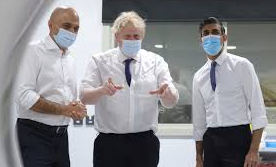
The Prime Minister insists that postponing expensive green policies is not driven by election fears, as his party faces internal disagreement over the approach.
Prime Minister Rishi Sunak has vehemently denied that delays in implementing key net zero policies are politically motivated, despite growing divisions within the Conservative Party. As the UK government revises its green agenda, Sunak dismissed suggestions that the postponements were timed to reduce the financial burden on voters ahead of the upcoming general election.
The prime minister’s comments come in the wake of internal disagreements within the Tory ranks regarding the government’s approach to climate policies. Some senior Conservative figures have expressed concerns that the delays could undermine the UK’s long-term environmental goals and harm the party’s reputation with green-conscious voters.
Sunak, however, has maintained that the decision to push back certain net zero targets was not driven by the looming election but was instead based on the need to ensure that the transition to a low-carbon economy happens in a “pragmatic and cost-effective” way. He argued that it is essential to balance the urgency of addressing climate change with the need to manage the economic impact of the policies, particularly in light of the cost-of-living crisis and current economic pressures.
“The decision to delay certain aspects of the net zero plan is not about politics,” Sunak stated. “It’s about making sure that we are doing this in a way that works for everyone, that ensures no one is left behind, and that the UK’s transition to a greener economy remains both ambitious and affordable.”
However, critics within his own party argue that the government is risking the UK’s standing in international climate leadership. Some have pointed out that pushing back ambitious green policies could damage the UK’s credibility on the world stage, particularly as the government is preparing to host the upcoming COP28 climate conference.
Sunak’s strategy also appears to be at odds with some of the party’s more environmentally-conscious MPs, who have warned that delaying policies like the ban on petrol and diesel cars could alienate voters, particularly younger generations concerned about climate change. These tensions reflect a growing rift within the Conservative Party over the best approach to balancing environmental goals with economic considerations.
The debate surrounding net zero policies is expected to intensify as the election approaches, with both the government and the opposition parties preparing their respective green agendas. While Labour has pushed for more aggressive climate action, Sunak’s government continues to emphasise the importance of a cautious and measured approach.
As the public waits to see how these policy delays will impact the upcoming election, Sunak’s government is under pressure to present a unified and coherent strategy that addresses both climate change and economic stability.












